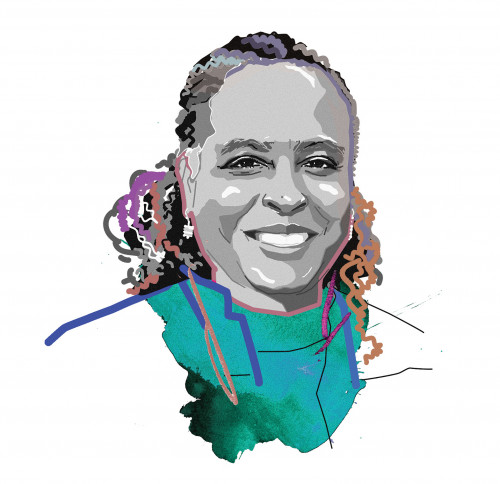main content Dialogue Across Differences
No matter the issue, colleges and universities must always be places that welcome an open exchange of ideas.

It has been an inspiring and challenging spring on Lewis & Clark’s campus.
We are deep in the trenches working on a strategic plan. It will be a road map to determine our priorities over the next five to seven years. Together, staff, faculty, and leadership have identified a number of key themes to guide our work, which include leveraging the strengths of our three schools to benefit our students; supercharging our commitment to the student experience and to experiential learning; and continuing to enhance the inclusiveness of our community. I look forward to sharing highlights from the finalized plan with you in future issues.
While the campus has been engaged in this important work, we have also been grappling with the major issues of our day. Like many, we are feeling the impacts of the unfolding human tragedies in Gaza, Palestine, and Israel, and students have made their views known through acts of protest. Students speaking out on issues is nothing new. Some of you may remember protesting against the Vietnam War in the late 1960s and early 1970s, or urging divestment from South Africa to end Apartheid in the 1980s. Institutions of higher learning are often a bellwether of the nation’s tensions.
No matter the issue, colleges and universities must always be places that welcome an open exchange of ideas.
No matter the issue, colleges and universities must always be places that welcome an open exchange of ideas. This principle is central to the educational mission. At the same time, we must strive to be places that model respectful disagreement that builds community. It is a challenging balance. There are no easy answers.
What I know is that as a community of scholars, we must practice the skill of listening and speaking across differences. It is the path to greater understanding and to making the world a better place. The Community Dialogues initiative, which you’ll read about in these pages, is just one way we are working toward creating this better world. We must teach it, model it, live it—no matter how difficult the road.
In these pages, I am also pleased to share other ways that our students and faculty are making a positive difference in the world. Our graduate school’s Community Counseling Center is helping to fill an urgent need for care while also educating the next generation of mental health counselors. Our faculty are engaged in relevant scholarship, like a study that examines rising gun ownership among unconventional populations in the United States. Our law school is leading the way on innovation in legal education.
All of these stories stem from L&C’s essential character: our willingness to be bold in pursuing knowledge and thoughtful in creating community. I am so grateful that you are a part of it and
look forward to continuing to engage on topics that matter to the campus and the world.

Robin H. Holmes-Sullivan, PhD
President
More L&C Magazine Stories
L&C Magazine is located in McAfee on the Undergraduate Campus.
MSC: 19
email magazine@lclark.edu
voice 503-768-7970
fax 503-768-7969
The L&C Magazine staff welcomes letters and emails from readers about topics covered in the magazine. Correspondence must include your name and location and may be edited.
L&C Magazine
Lewis & Clark
615 S. Palatine Hill Road
Portland OR 97219

